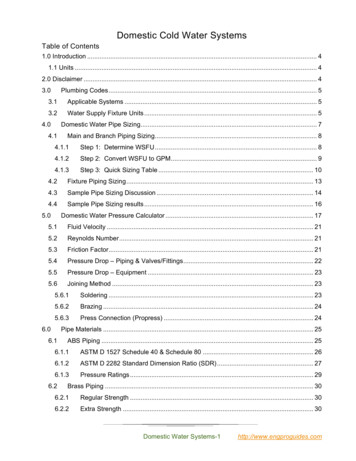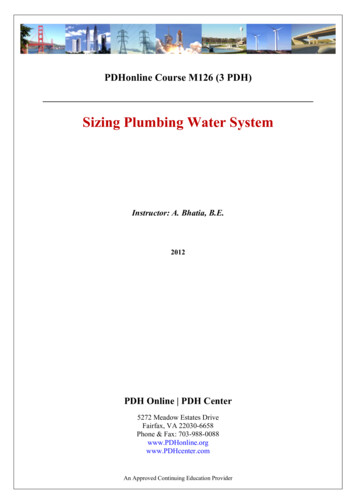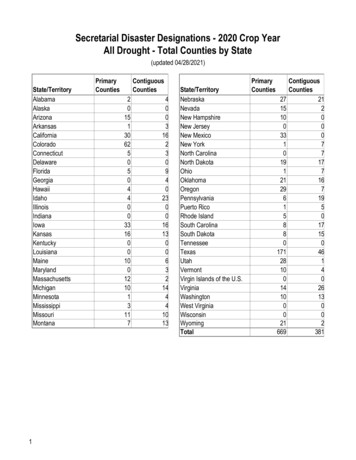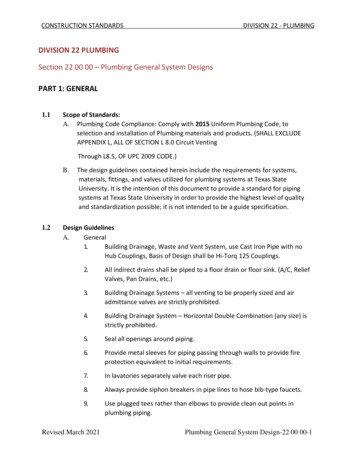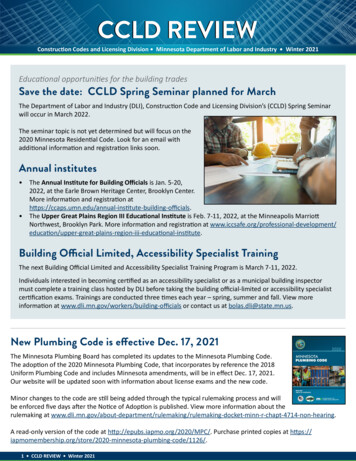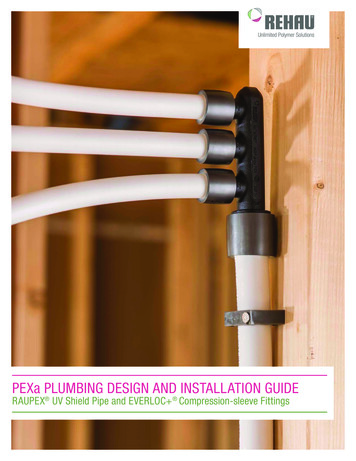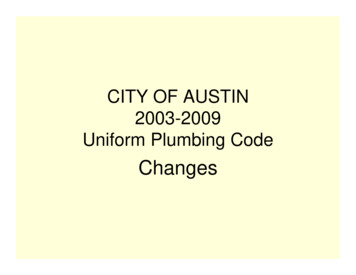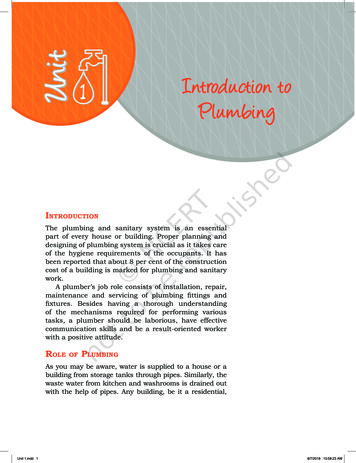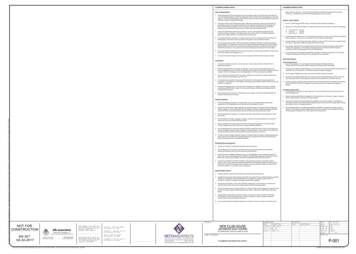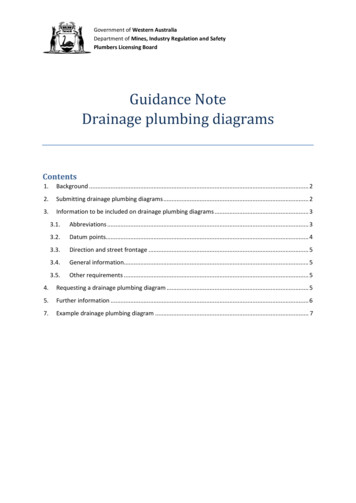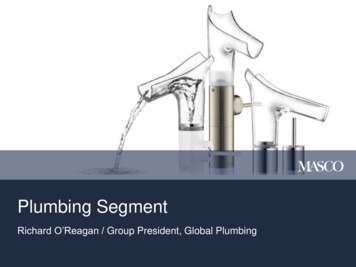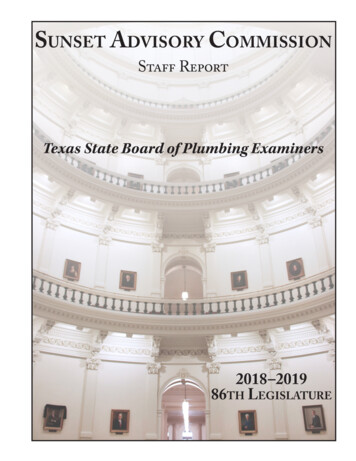
Transcription
Sunset Advisory CommissionStaff ReportTexas State Board of Plumbing Examiners2018 –201986th Legislature
Sunset Advisory CommissionSenator Brian BirdwellRepresentative Chris PaddieChairVice ChairSenator Dawn Buckingham, M.D.Representative Dan FlynnSenator Bob HallRepresentative Stan LambertSenator Robert NicholsRepresentative Poncho NevárezSenator Kirk WatsonRepresentative Senfronia ThompsonEmily Pataki, Public MemberRonald G. Steinhart, Public MemberJennifer JonesActing DirectorCover Photo: The Texas Capitol rotunda houses the Texas Governors and Presidents Portrait Gallery. The gallery includesportraits of every government leader in Texas’ history, including several presidents when Texas won its independencefrom Mexico and became a republic. Photo Credit: Janet Wood
Texas State Board ofPlumbing ExaminersSunset Staff Report2018–201986th Legislature
HowtoRead Sunset ReportsEach Sunset report is issued three times, at each of the three key phases of the Sunset process, to compileall recommendations and actions into one, up-to-date document. Only the most recent version isposted to the website. (The version in bold is the version you are reading.)1. Sunset Staff Evaluation PhaseSunset staff performs extensive research and analysis to evaluate the need for, performance of,and improvements to the agency under review.First Version: The Sunset Staff Report identifies problem areas and makes specificrecommendations for positive change, either to the laws governing an agency or in the formof management directives to agency leadership.2. Sunset Commission Deliberation PhaseThe Sunset Commission conducts a public hearing to take testimony on the staff report and theagency overall. Later, the commission meets again to vote on which changes to recommend tothe full Legislature.Second Version: The Sunset Staff Report with Commission Decisions, issued after the decisionmeeting, documents the Sunset Commission’s decisions on the original staff recommendationsand any new issues raised during the hearing, forming the basis of the Sunset bills.3. Legislative Action PhaseThe full Legislature considers bills containing the Sunset Commission’s recommendations oneach agency and makes final determinations.Third Version: The Sunset Staff Report with Final Results, published after the end of thelegislative session, documents the ultimate outcome of the Sunset process for each agency,including the actions taken by the Legislature on each Sunset recommendation and any newprovisions added to the Sunset bill.
TableofContentsPageSummary of Sunset Staff Recommendations.1Agency at a Glance.5Issues/Recommendations1The Texas Department of Licensing and Regulation Could MoreEffectively Regulate Plumbers.92Overregulation and Complex Licensure Requirements Inhibit EntryInto and Growth in the Plumbing Industry.193Inefficient Enforcement Processes Hinder Effective Public Protectionand Fair Treatment of Licensees.31AppendicesAppendix A — Historically Underutilized Businesses Statistics.37Appendix B — Equal Employment Opportunity Statistics.41Appendix C — License, Registrations, and Endorsements.43Appendix D — Staff Review Activities.47
Summary of Sunset StaffRecommendations
Sunset Advisory CommissionNovember 2018SummaryPlumbing is a cornerstone of a modern civilization but often taken for granteduntil disasters, such as Hurricane Harvey and the recent historic floodingacross Central Texas, reveal our dependency on proper plumbing to protect ourhealth and safety. Currently, Texas has about 58,000 licensed plumbers, but theskyrocketing population growth and recurring severe storms have driven thedemand for plumbing services well beyond the industry’s capacity. Difficultymeeting demand for plumbers exacerbates affordable housing shortages andincreases costs for construction, repairs, and maintenance, all of which impact thestate’s citizens and economy. With demand increasing, but supply plateauing,the regulation of plumbing in Texas is in need of serious change.The Sunset review of the Texas State Board of PlumbingExaminers began by observing the agency’s response toThe regulation oflicensees and consumers trying to recover from Hurricaneplumbing in Texas is inHarvey’s 125 billion toll. The small agency struggled toneed of serious change.allocate its already stretched staff and resources, and to navigatesometimes restrictive statutory requirements. However, Sunsetstaff found many problems existed long before the storm and were within theboard’s control to fix, but the board and agency leadership have a track recordof neglecting known deficiencies. Ongoing problems and frustrations includebacklogged exams, with more than 1,400 individuals waiting to take exams;poor customer service, with the agency only able to answer about 62 percentof its calls; and growing complaint caseloads and resolution times, with eachinvestigator handling between 45 to 100 complaints and the average complaintresolution time doubling to almost six and a half months.Sunset staff also found a litany of constraints on plumbers that make entryinto the trade and progression through a career difficult, some of which arestatutorily created and others self-imposed or worsened by the agency. Further,the agency’s enforcement processes fail to meet standard practices to ensureconsistent, documented, and fair application of laws and rules to licensees, ortransparency for the public.Board members and agency leadership have acknowledged some of thesepersistent problems, but have failed to appropriately address them, and broaderproblems, like the workforce shortage, have been exacerbated by board inattentionand unwillingness to change the status quo. Ultimately, Sunset staff concludedthe agency’s reticence to change no longer meets the expectations of the stateor the growing demands of the industry and recommends transferring theregulation of plumbing to the Texas Department of Licensing and Regulation(TDLR), which has streamlined and provided more effective oversight for 24regulatory programs transferred by the Legislature since 2001. TDLR regulatesseveral other construction trades, including electricians and air conditioningTexas State Board of Plumbing Examiners Staff ReportSummary of Sunset Staff Recommendations1
November 2018Sunset Advisory Commissionand refrigeration technicians, and can capitalize on that experience to provide more consistent, robustoversight of plumbing in Texas. The following material summarizes Sunset staff recommendations onthe Texas State Board of Plumbing Examiners.Issues and RecommendationsIssue 1The Texas Department of Licensing and Regulation Could More EffectivelyRegulate Plumbers.Regulation of plumbing continues to be critical for the health and safety of Texans by ensuring installation,repair, and maintenance of plumbing infrastructure is only performed by qualified plumbers and inspectors.However, the independent plumbing board is struggling to meet the demand from licensees and thepublic. Sunset staff found the board and agency leadership have not responded effectively to problemswithin their control to fix, and have made changes without considering the bigger picture, misplacingefforts and resources without fully addressing core issues.Key Recommendation Transfer the regulation of plumbers to TDLR, and reconstitute the independent plumbing boardas an advisory board.Issue 2Overregulation and Complex Licensure Requirements Inhibit Entry Into andGrowth in the Plumbing Industry.Several aspects of the agency’s licensing processes create needless barriers to becoming a plumber oradvancing in careers. For example, apprentice registrations and supervision requirements for entrylevel plumbers put unnecessary burdens on the industry without clear benefit. Further, outdated examsand their administration have resulted in an unprecedented backlog — with wait times of up to eightmonths — that keeps plumbers from advancing in their careers, and overregulated continuing educationincreases costs for licensees. Sunset staff also found opportunities to modernize the regulation ofplumbing contractors.Key Recommendations 2Eliminate the responsible master plumber designation and create a plumbing contractor license.Eliminate the separate drain cleaner-restricted, drain cleaner, and residential utilities installerregistrations.Remove statutory requirements for direct supervision and authorize the board to determine supervisionrequirements for specific tasks in rule.Authorize the board to outsource the creation and administration of its exams, and direct the boardto revise its exams to eliminate practical components.Texas State Board of Plumbing Examiners Staff ReportSummary of Sunset Staff Recommendations
Sunset Advisory CommissionNovember 2018Issue 3Inefficient Enforcement Processes Hinder Effective Public Protection and FairTreatment of Licensees.In reviewing the agency’s enforcement functions, the review found certain processes do not match modelstandards or common practices observed through Sunset staff ’s experience in reviewing regulatoryagencies. For example, inefficient and unnecessary aspects of the agency’s complaint resolution processes,including a cumbersome statutory enforcement committee, risk fair and timely enforcement action. Theagency’s unfocused enforcement efforts and a lack of easily accessible disciplinary information furtherinhibit the agency’s ability to protect the public effectively and transparently.Key Recommendations Repeal the statutory enforcement committee.Direct the agency to adopt a risk-based approach to investigations in rule, focusing on higher riskcomplaints first before other lower risk activities, such as jobsite compliance checks.Direct the agency to use informal settlement conferences in appropriate circumstances and betterdocument its use of this tool.Direct the agency to publish disciplinary histories online.Fiscal Implication SummaryOverall, the recommendation to transfer plumbing regulation to TDLR would result in an estimatedsavings of about 768,000 in general revenue over the next five fiscal years. The savings would resultprimarily from capitalizing on TDLR’s size and structure, reducing the number of employees neededto regulate the industry, and eliminating administrative costs necessary for an independent agency. Thetransfer would also result in more efficient and focused administration of plumbing regulation. The otherrecommendations in this report to streamline and simplify licensure functions, including outsourcingexams, and to remove bottlenecks and shore up enforcement processes would result in efficiencies,but would not have a significant fiscal impact. Together, these recommendations would create a moretransparent and efficient regulatory program for licensees and Texas.Issue 1 — TDLR would assume responsibility for the plumbing board’s functions on September 1, 2020,but would need the plumbing board’s separate building and facilities for an additional year to ensure asmooth transition of licensing, examination, and enforcement functions. As such, most savings wouldbe realized after fiscal year 2021. The plumbing board has 31 full-time equivalent positions, all of whichwould be necessary to administer the plumbing program through fiscal year 2021. After that, TDLR’sprocess improvements would reduce the need for three employees who currently perform examinations.TDLR would need start-up costs for furniture, computers, and office supplies and, after fiscal year 2021,ongoing office rental costs for the 28 employees. Costs to convert the agency’s database into TDLR’sexisting database are anticipated to be 200,000. An additional 50,000 in one-time costs would benecessary to make other changes recommended in this report, including changes to the renewal processTexas State Board of Plumbing Examiners Staff ReportSummary of Sunset Staff Recommendations3
November 2018Sunset Advisory Commissionfor endorsements and licenses, replacing the responsible master plumber designation with a contractorlicense, and eliminating three registration types; 25,000 would be required each year thereafter tomaintain those changes.Texas State Board of Plumbing Examiners4FiscalYearCost to the GeneralRevenue FundSavings to the GeneralRevenue Fund2020 200,000 8,10302021 309,672 46,80302022 134,200 541,735-32023 134,200 541,735-32024 134,200 541,735-3Texas State Board of Plumbing Examiners Staff ReportSummary of Sunset Staff RecommendationsChange in Number ofFTEs From FY 2019
Agencyat aGlance
Sunset Advisory CommissionAgencyNovember 2018at aGlanceCreated in 1947, the Texas State Board of Plumbing Examiners’ mission is to protect Texas citizensagainst the health and safety hazards that can result from improperly installed plumbing, gas, and medicalgas systems. To fulfill this mission, the agency carries out the following key activities: Examines applicants, registers apprentices, and licenses tradesman, journeyman, and master plumbersand plumbing inspectorsOversees training courses for continuing education course providers and ensures licensees’ compliancewith continuing education requirementsInvestigates and resolves complaints, and takes disciplinary action when necessary to enforce theagency’s statutes and rulesKey Facts Texas State Board of Plumbing Examiners. The board consists of nine members appointed bythe governor, with the advice and consent of the Senate. As shown in the chart, Texas State Boardof Plumbing Examiners, seven members of the board are professionals and two represent the public.Members serve staggered six-year terms and oversee the agency’s policies and operations. Thegovernor designates the presiding officer of the board, and board members select a secretary fromtheir membership for a two-year term.1Texas State Board of Plumbing ExaminersMember TermQualificationJulio Cerda, Chair2014–2019Public MemberRick Guerra, Secretary2007–2017Licensed EngineerEnrique Castro2007–2017Master PlumberBen R. Friedman2016–2021Journeyman PlumberJanet L. Gallagher2011–2017Plumbing InspectorDavid Anthony Garza2014–2019Commercial Building ContractorMilton Gutierrez2016–2021Public MemberRobert Jalnos2016–2021Responsible Master PlumberEdward Thompson2008–2019Home Building ContractorFunding. The agency received about 5.2 million in revenue in fiscal year 2017, primarily fromlicensing and registration fees. The pie chart on the following page, Texas State Board of PlumbingExaminers Expenditures, shows how the agency spent its appropriation of about 2.6 million. Theagency transferred more than 2.5 million in excess of its appropriation to the General RevenueFund. The chart on the following page, Flow of Texas State Board of Plumbing Examiners Revenueand Expenditures, shows the overall impact of agency revenue and expenditures in fiscal year 2017.Texas State Board of Plumbing Examiners Staff ReportAgency at a Glance5
November 2018 Sunset Advisory CommissionAppendix A describes the agency’s use ofhistorically underutilized businesses inpurchasing goods and services for fiscalyears 2015 to 2017.Texas State Board of Plumbing ExaminersExpenditures – FY 2017Texas.gov 155,326 (6%)Inspections andEnforcement 1,230,602 (47%)Staffing. The agency was allocated 31Indirect Administrationstaff positions in fiscal year 2017. Most 314,434 (12%)staff work at the agency’s headquartersin Austin, but the agency has one fieldLicensing andExaminationsinvestigator in each of nine regions that 911,272(35%)cover the state. The agency is a member Total: 2,611,634of the Health Professions Council,which provides information technology staffing for the agency and other professional licensingagencies. A comparison of the agency’s workforce composition to the percentage of minorities inthe statewide civilian workforce for the past three fiscal years is included in Appendix B.Flow of Texas State Board of Plumbing ExaminersRevenue and Expenditures – FY 2017Texas.gov Fee 155,326Texas.gov Fee 155,326AppropriatedReceipts 56,465Agency Feesand Charges 4,755,154Agency Costs 2,273,479Employee Benefits 135,352Health ProfessionsCouncil 182,829Civil Penalties 195,656Total: 5,162,601General Revenue 2,550,967 6Licensing. The agency issues and renews registrations, licenses, and endorsements for plumbingapprentices, tradesman, journeyman, and master plumbers, as well as plumbing inspectors, as shownin the table on the following page, Plumbing Licenses. The traditional career path begins with anapprenticeship, which eventually qualifies the individual to receive a journeyman license. Afterobtaining additional experience, plumbers can apply for their master license. In 2001, the Legislaturecreated the tradesman plumber-limited license to serve as an optional stepping stone between theapprenticeship and licensure as a journeyman plumber.2 Each level of licensure entails classroomtraining and examinations, in addition to years of on-the-job experience under supervision by atradesman, journeyman, or master plumber. Additionally, plumbers at each level can obtain differentTexas State Board of Plumbing Examiners Staff ReportAgency at a Glance
Sunset Advisory Commission endorsements that authorize them to performspecific plumbing-related duties, such as installingmedical gas piping in hospitals. Appendix Cprovides more detail on the prerequisites for andwork authorized by each license, registration, andendorsement.November 2018Plumbing LicensesLicense TypePlumbing Apprentice RegistrationTradesman Plumber-Limited LicenseJourneyman Plumber LicenseNumber*26,6202,36017,862Examinations. The agency requires anMaster Plumber License3,512examination for almost every registration, Responsible Master Plumber6,968license, and endorsement. Examinations at the(Master License)apprentice level are open-book, written exams. Plumbing Inspector License1,302Advanced-level exams — those given forTotal58,624tradesman, journeyman, and master plumbersand plumbing inspectors — include at least a * Active as of July 26, 2018.written component, but several also include ahands-on, practical component. These advanced exams are conducted primarily at the agency’sheadquarters in Austin, but a small portion of written exams are also administered in other locationson an ad hoc basis. In fiscal year 2017, the agency conducted more than 2,600 advanced exams, andthe overall passage rate for all exams was about 71 percent.Continuing education. Plumbers, other than apprentices, must acquire six hours of continuingeducation each year to ensure ongoing competency in the industry, or more if the individual also holdsa medical gas endorsement. The agency oversees continuing education compliance for licensees, andapproves course content, instructors, and course providers. The agency also approves the instructionalmaterials for continuing education courses. In fiscal year 2017, the agency authorized three publishersto provide instructional materials for plumbers’ continuing education.Enforcement. The agency assigns one field investigator to each of the nine regions across the stateto conduct investigations on complaints and ensure compliance with local plumbing ordinances andstate laws and rules. In fiscal year 2017, the agency received 936 complaints and conducted 820investigations. Field investigators also conducted 8,261 compliance checks to ensure individualson jobsites have the correct license or registration and requisite supervision for the work beingperformed.3 The table on the following page, Enforcement Activities, provides more detail on theagency’s enforcement program.Texas State Board of Plumbing Examiners Staff ReportAgency at a Glance7
November 2018Sunset Advisory CommissionEnforcement Activities – FY 2017Complaints ReceivedFrom the public401Initiated by agency457Total936From licensees78Allegations in Complaints ReceivedInsufficient funds to pay board34Furnishing false information45Plumbing code violation46Misrepresentation67Unlicensed practice83Advertisement issue89Evading responsibility121Local/Permit violation140Criminal convictions199Contracting without ResponsibleMaster Plumber223Other28Total1,075Complaints Closed by ry compliance108Warning or reprimand147Administrative penalty293Probation or suspension3Revocation1Revocation due to conviction128Other112Total1,133* Complaints may originate from prior fiscal year.1All citations to Texas statutes are as they appear on http://www.statutes.legis.texas.gov/. Section 1301.157, Texas Occupations Code;22 T.A.C. Section 361.15 establishes the two-year term limit for the board’s secretary.82Chapter 504 (H.B. 1505), Acts of the 77th Texas Legislature, Regular Session, 2001.3Section 1301.203(b), Texas Occupations Code.Texas State Board of Plumbing Examiners Staff ReportAgency at a Glance
Issues
Sunset Advisory CommissionNovember 2018Issue 1The Texas Department of Licensing and Regulation Could MoreEffectively Regulate Plumbers.BackgroundThe Legislature began regulating plumbing at the local level in 1897 by requiring every city withunderground sewers or cesspools to establish a board to examine and supervise plumbers.1 After findinglocal control impeded the ability of plumbers to practice throughout the state, the Legislature createdthe Texas State Board of Plumbing Examiners in 1947 to provide uniform oversight and jurisdictionof plumbers.2 The agency now regulates more than 58,000 individuals with a staff of 31 and an annualbudget of approximately 2.6 million.The agency’s mission is to protect Texas citizens against the health and safety hazards that can resultfrom improperly installed plumbing, gas, and medical gas systems. To accomplish this task, the agencyoversees the registration of apprentice plumbers and the examination and licensure of tradesman,journeyman, and master plumbers and plumbing inspectors. The agency also takes enforcement actionsfor violations of statute, board rules, and local plumbing codes and ordinances.FindingsTexas has a continuing need to regulate the plumbing industrythroughout the state. Potential for harm. The proper installation, maintenance, and repair ofplumbing systems and fixtures is vital to a developed civilization. Poorquality plumbing can breed diseases in the water supplied to homes andbusinesses, such as legionnaires disease or bacterial dysentery. Improperlyinstalled water heaters can cause explosions or fires that result in seriousinjury or death. Plumbing also encompasses piping for gases in medicalsettings, like hospitals or dental offices, which can be catastrophic ifimproperly installed or maintained. Regulation ensures that only qualifiedindividuals perform plumbing work to best protect the public.Poor qualityplumbing canbreed diseases.State-level regulation. Texas, like most states, regulates plumbing on astatewide level, although six states provide for local regulation of plumbersthrough counties or municipalities. Prior to the agency’s creation in 1947,local jurisdictions in Texas were often reluctant to permit new plumberswho were unfamiliar with that city’s particular plumbing system and codes,which fostered a protectionist attitude toward regulation. In creatingthe agency, the Legislature found the localized system created an unevendistribution of the plumbing workforce throughout Texas, which in turnlimited the state’s ability to build homes for veterans returning from war.3Further, the adoption of statewide plumbing codes beginning in 1993,and residential construction codes in 2001, largely standardized plumbinginstallation, maintenance, and repair standards throughout the state.4Texas State Board of Plumbing Examiners Staff ReportIssue 19
November 2018Sunset Advisory CommissionThe plumbing board does not effectively carry out its duties toregulate plumbing and oversee agency operations.The reviewfound seriousdeficiencies inthe agency’soperations andoverregulationof the industry.Every Sunset review is guided by criteria focusing on the efficiency andeffectiveness of the agency, and the extent to which the agency achieves itsmission.5 The primary role of state regulation of occupations is to protectthe public health, safety, or welfare, but the regulation should be no moreburdensome than necessary to achieve that objective. Given the clear need toregulate plumbing services, Sunset staff asked more specifically whether theagency’s regulation of plumbers truly puts public safety first, and if the amountof state control of the industry is appropriate. Unfortunately, the review foundserious deficiencies in the agency’s operations and overregulation of the industrythat limit entry and growth in plumbing profession at a time when the stateand nation face a workforce shortage of plumbers. Some of these problemsstem from statutory requirements, but many issues arise from lax oversightand direction from the board and agency leadership. Board behavior reflectsa misplaced focus on regulation for the benefit of the industry, rather than toprotect the public. Despite a noticeably dedicated staff, the agency’s long-termstruggle to correct major managerial problems and redirect its attention to itsprimary responsibilities indicate an inability to effectively regulate plumbing. Applicants mustwait five to eightmonths to takerequired exams.10Failure to fix known, persisting deficiencies. Both the board and agencyhave a demonstrated track record of neglecting known deficiencies.Since the last Sunset review of the agency in 2002, the Legislature hasincreased scrutiny of the agency and considered transferring it to the TexasDepartment of Licensing and Regulation (TDLR) in 2011.6 However,many problems identified in 2002 have persisted without demonstrableimprovement. Broader problems, like the workforce shortage, have beenexacerbated by board inattention and unwillingness to change the statusquo. Throughout this Sunset review, stakeholders, applicants, and licenseesexpressed ongoing frustrations regarding backlogged exams and poorcommunication, among other issues, which board members and agencyleadership have often acknowledged but failed to appropriately address.Meanwhile, the agency has asked the Legislature to expand its mission toinclude providing more public education and outreach opportunities atcommunity and vocational recruitment events, such as job fairs and careerdays, without first successfully fulfilling its primary responsibilities.7Unacceptably long exam wait times. The agency requires applicants forlicensure or endorsements to come to its Austin headquarters to takewritten and practical exams where the agency’s four examiners administerexams to about 10 to 30 individuals each day. Demand for exams has beensteadily growing — the agency administered 1,950 exams in fiscal year2012 compared to 2,951 in 2018 — but applicants must now wait five toeight months to test, stalling their ability to work and discouraging careeradvancement. As of September 2018, more than 1,400 individuals werewaiting to take exams. Because exams can take a full day to complete,many applicants must stay in hotels overnight in Austin, adding to theexpense and inconvenience.Texas State Board of Plumbing Examiners Staff ReportIssue 1
Sunset Advisory CommissionNovember 2018Despite these unacceptably long wait times, the board and agency havedemonstrated an unwillingness and inability to fix this serious problem.The board’s subcommittee on exams has not met since 2011, although othersubcommittees have been able to meet, and the agency has only discussedthe possibility of using a single mobile unit to administer practical examsacross the state, even though it stopped giving the written portions of thetradesman and journeyman exams outside of Austin for fiscal years 2017and 2018. The exam backlog limits entry and advancement in the trade,contributing to the workforce shortage of plumbers that impacts laborcosts for both home construction and repair, which ultimately results inhigher costs for Texas consumers. Further, Sunset staff heard criticismsthroughout the review that the exam content is outdated and focuseson narrow aspects of plumbing, and the written exams are only offeredin English and Castilian Spanish. In Issue 2, Sunset staff recommendsseveral changes to make the exams more functional and accessible for themodern plumbing workforce.Poor customer service. The agency is overwhelmed by and unable tomeet the demands for customer service from its licensee population andthe public. In an average month, the agency receives about 4,200 callsbut is only able to answer about 62 percent, and about 650 individualsphysically come into the agency for help with licensing, payments, and otherquestions. The agency has recognized and acknowledged its diminishingcustomer service over the past several years, requiring existing employees tojuggle competing demands between their primary job responsibilities andresponding to customer service needs. However, the agency has only pursuedadditional staff positions that would have a peripheral effect on customerservice. In at least the past three biennia, the agency has not requested adedicated customer service position for the licensing department, whichreceives about 60 percent of customer service calls, but this year requesteda customer service positio
Created in 1947, the Texas State Board of Plumbing Examiners' mission is to protect Texas citizens against the health and safety hazards that can result from improperly installed plumbing, gas, and medical gas systems. To fulfill this mission, the agency carries out the following key activities:
